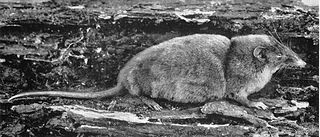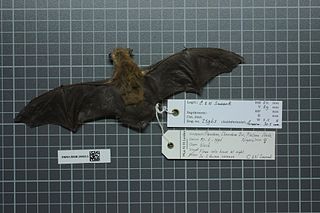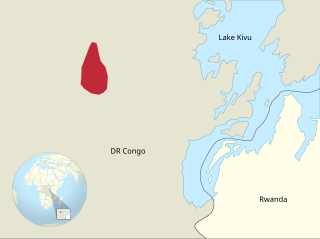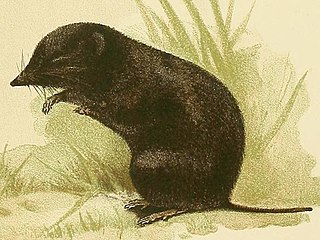The link rat is a species of rodent in the family Muridae. It is also known by the common name Congo forest mouse. It is native to central Africa.

The hero shrew, also known as the armored shrew, is a large shrew native to the Congo Basin of Africa. Its features are typical of a white-toothed shrew − short legs, slender snout, dense fur − except for a highly unusual spinal column. It has corrugated interlocking vertebrae that are unique among mammals except for its sister species, Thor's hero shrew. This unique adaptation allows the animal to bear a huge amount of weight on its back − 72 kg (159 lb) according to an expedition team.

Neoromicia is a genus of vesper bat in the family Vespertilionidae. It contains the following species:

Delany's mouse or Delany's swamp mouse is a species of rodent in the family Nesomyidae. It is the only species in the genus Delanymys and the only extant member of subfamily Delanymyinae, which also contains the fossil genus Stenodontomys. It was previously placed in subfamily Petromyscinae, but it is apparently not closely related to Petromyscus. It is found in Democratic Republic of the Congo, Rwanda, and Uganda. Its natural habitats are subtropical or tropical high-altitude shrubland and swamps. It is threatened by habitat loss.
The moon striped mouse or Ruwenzori hybomys is a species of rodent in the family Muridae. It is found in Democratic Republic of the Congo, Rwanda, and Uganda. Its natural habitat is subtropical or tropical moist montane forests. It is threatened by habitat loss.
Peters's striped mouse or Peters's hybomys is a species of rodent in the family Muridae. It is found in Angola, Burundi, Cameroon, Central African Republic, Republic of the Congo, Democratic Republic of the Congo, Equatorial Guinea, Gabon, Nigeria, Rwanda, Uganda, and Zambia. Its natural habitats are subtropical or tropical dry forest, subtropical or tropical moist lowland forest, and subtropical or tropical moist montane forest.
Hylomyscus is a genus of rodent in the family Muridae endemic to Africa.
The montane hylomyscus or montane wood mouse is a species of rodent in the family Muridae. A long-coated species with brownish-grey upper parts and whitish-grey underparts, it occurs in the uplands of tropical Central Africa where its natural habitat is tropical moist montane forests.
The toad mouse is a species of rodent in the family Muridae. It is found in Burundi, Democratic Republic of the Congo, Rwanda, and Uganda. Its natural habitats are subtropical or tropical moist montane forests and arable land.

The Ethiopian amphibious rat, also known as the Ethiopian water mouse, is an insectivorous and semiaquatic species of rodent in the monotypic genus Nilopegamys of the family Muridae. There has only been one known specimen. It was found along the Lesser Abay River near its source at an altitude of 2600 m in the highlands of northwestern Ethiopia in 1928. N. plumbeus is considered to be the most aquatically adapted African murid; its unusually large brain is thought to be one consequence of this lifestyle. The species is considered to be critically endangered or possibly extinct, since its habitat has been severely damaged by overgrazing and monoculture.

The common rufous-nosed rat is a species of rodent in the family Muridae. It is found in Angola, Burundi, Cameroon, Central African Republic, Republic of the Congo, Democratic Republic of the Congo, Equatorial Guinea, Ethiopia, Gabon, Kenya, Nigeria, Rwanda, South Sudan, Tanzania, and Uganda. Its natural habitats are subtropical or tropical seasonally wet or flooded lowland grassland and seasonally flooded agricultural land.
Jackson's soft-furred mouse or Jackson's praomys is a species of rodent in the family Muridae. It is found in Angola, Burundi, Cameroon, Central African Republic, Republic of the Congo, Democratic Republic of the Congo, Equatorial Guinea, Gabon, Guinea, Kenya, Nigeria, Rwanda, South Sudan, Tanzania, Uganda, and Zambia. Its natural habitats are subtropical or tropical moist lowland forest, subtropical or tropical moist montane forest, arable land, and heavily degraded former forest.

The Kahuzi swamp shrew is a species of mammal in the family Soricidae found in the Democratic Republic of the Congo. Its natural habitat is swampland.

Myosorex is a mammal genus in the Soricidae (shrew) family. The genus, collectively referred to as the mouse shrews, contains these species:

Laephotis is a genus of bats in the family Vespertilionidae. Species within this genus are:
Interdigital webbing refers to the presence of skin membranes. Normally, in mammals, webbing is present but resorbed later in development, but in various mammal species, it occasionally persists in adulthood. In humans, it can be found in those suffering from LEOPARD syndrome and from Aarskog–Scott syndrome.
Hylomyscus endorobae is a species of rodent of the genus Hylomyscus that is found only in select portions of the wet East African montane forests of the Kenyan Rift mountains of southwestern Kenya and Tanzania, and only at elevations above 2,000 metres (6,600 ft).
The Kahuzi horseshoe bat is a species of bat in the family Rhinolophidae, found in eastern Democratic Republic of the Congo. It is named after Mount Kahuzi.
The Bururi forest shrew is a species of mouse shrew native to Burundi. It was first described by Peterhans et al. in 2010, and is defined by a broad hexagonal skull, short tail, and long claws.
















